My Dog Always Eats First:
Homeless People and Their Animals
Leslie Irvine
A weary-looking man stands at an intersection, backpack at his feet. Curled up nearby is a mixed-breed dog, unfazed by the passing traffic. The man holds a sign that reads, "Two old dogs need help. God bless." What's happening here?
Leslie Irvine breaks new ground in the study of homelessness by investigating the frequently noticed, yet underexplored, role that animals play in the lives of homeless people. Irvine conducted interviews on street corners, in shelters, at highway underpasses, to provide insights into the benefits and liabilities that animals have for the homeless. She also weighs the perspectives of social service workers, veterinarians, and local communities. Her work provides a new way of looking at both the meaning of animal companionship and the concept of home itself.
Leslie Irvine is professor of sociology at the University of Colorado at Boulder. Her books include
If You Tame Me: Understanding Our Connection with Animals and
Filling the Ark: Animal Welfare in Disasters.
Also of interest:
Confronting Homelessness: Poverty, Politics, and the Failure of Social Policy by David Wagner with Jennifer Barton Gilman and
At Home On The Street: People, Poverty, and a Culture of Homelessness by Jason Adam Wasserman and Jeffrey Michael Clair
"This engaging book makes an important contribution to the literature about the lifestyles of the homeless population, whose circumstances are arguably among the greatest social problems in US cities."—Jayne Howell, City & Society
"A valuable contribution to knowledge."—Zoei Sutton, Anthrozoös
"Provides crucial insights for anyone interested in a deeper understanding of homelessness [and] human-animal relationships.... Taking the reader from slur and stereotype to in-depth understanding and implications for housing policy, Irvine's book is lively, well-referenced, well-organized, jargon-free, and a worthy read for students, researchers, and policymakers concerned with homelessness."—Ryan Sheppard, Contemporary Sociology
"Present[s] compelling findings that companion animals enhance the lives and bolster the sense-of-self maintained by homeless individuals.... Irvine's research is a refreshing and worthwhile contribution to sociology and also, a heartfelt study of the intense bonds between humans and non-human animals."—Abigail E. Cameron, Qualitative Sociology
"This is a much needed book.... [It] makes a valuable contribution by bringing a hidden issue to light, and doing so by remaining faithful to the narratives of those who provided information and access to this previously under-researched area."—Nik Taylor, Social Forces
"My Dog Always Eats First is thoroughly researched both analytically and narratively; it is astute and insightful; compassionate and humane.... Irvine neither idealizes nor advocates pet ownership among homeless individuals. She does, however, use her sociological skills to humanize the animal-human bond among even the most vulnerable segment of our society."—Cheryl Joseph, Humanity & Society
"Aptly demonstrates the central role that animals (primarily dogs) play in the lives of some of the homeless community.... Highly recommended."—Choice
"Irvine tells the stories of her interview subjects with compassion (but through an objective researcher's lens) and successfully humanizes the homeless/pet ownership issue in our country."—Hilary Daninhirsch, ForeWord Reviews
"This is a wonderful book. Leslie Irvine brings to life an overlooked, but immensely important phenomenon. By exploring the human-animal relationships of homeless pet owners, she allows us to peer into the construction of social and moral identities in a unique way, and with remarkable ease and clarity."—Jason Adam Wasserman, Kansas City University of Medicine and Biosciences
"Irvine reveals the stories, meanings, and identities that homeless people create with their pets in socially marginal and stigmatized environments. My Dog Always Eats First is a valuable, and insightful, contribution."—Leon Anderson, Utah State University
- A Good Life for a Dog?
- Accessing Homeless Pet Owners.
- Confrontations and Donations.
- Friend and Family.
- The "Pack of Two."
- Protectors.
- Lifechangers and Lifesavers.
- Implications for Research and Policy.






